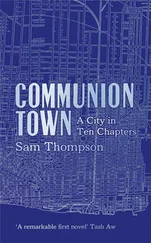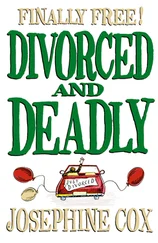Frank Tallis - Deadly Communion
Здесь есть возможность читать онлайн «Frank Tallis - Deadly Communion» весь текст электронной книги совершенно бесплатно (целиком полную версию без сокращений). В некоторых случаях можно слушать аудио, скачать через торрент в формате fb2 и присутствует краткое содержание. Жанр: Исторический детектив, на английском языке. Описание произведения, (предисловие) а так же отзывы посетителей доступны на портале библиотеки ЛибКат.
- Название:Deadly Communion
- Автор:
- Жанр:
- Год:неизвестен
- ISBN:нет данных
- Рейтинг книги:3 / 5. Голосов: 1
-
Избранное:Добавить в избранное
- Отзывы:
-
Ваша оценка:
- 60
- 1
- 2
- 3
- 4
- 5
Deadly Communion: краткое содержание, описание и аннотация
Предлагаем к чтению аннотацию, описание, краткое содержание или предисловие (зависит от того, что написал сам автор книги «Deadly Communion»). Если вы не нашли необходимую информацию о книге — напишите в комментариях, мы постараемся отыскать её.
Deadly Communion — читать онлайн бесплатно полную книгу (весь текст) целиком
Ниже представлен текст книги, разбитый по страницам. Система сохранения места последней прочитанной страницы, позволяет с удобством читать онлайн бесплатно книгу «Deadly Communion», без необходимости каждый раз заново искать на чём Вы остановились. Поставьте закладку, и сможете в любой момент перейти на страницу, на которой закончили чтение.
Интервал:
Закладка:
Erstweiler groaned. He turned his head to the side and a thin plumb line of clear saliva dropped from the corner of his mouth.
‘What I don’t understand,’ said Rheinhardt, ‘is why his accomplice ran off, leaving her house behind and presumably whatever monies Herr Kolinsky had saved. I mean to say, it rather defeats the object of the exercise. Presumably the plan was to report Herr Kolinsky missing to the police and in due course they intended to embark on a new life together. They just might have got away with it!’
‘The answer is quite straightforward,’ Liebermann responded. ‘Frau Milena, like Herr Erstweiler, was not a natural wrongdoer. She would never have been able to kill her husband unassisted: she needed someone to do it for her. Even so, complicity was not enough to dilute her guilt. It must have risen up, unexpected, and crashed around her like a great wave of horror and misery. She could not cope, and in a state of extreme distress she sought relief by interposing as much distance as she could between herself and the scene of her crime.’
‘Where do you think she is?’
‘Who knows?’
‘I wonder when she left.’
‘That question I think I can answer. Her departure would have coincided with the onset of Erstweiler’s illness. The two are linked. One can imagine the poor fellow, waking up, reaching out across the empty bed, no longer able to benefit from the sweet, soothing balm of confederacy. He would have risen that morning and stood in the fierce heat of his own conscience. And — more importantly — he would have been aware that he stood there alone. When he looked at himself in the shaving mirror he would have seen not Norbert Erstweiler, warehouse clerical officer, but the repugnant face of a murderer. Thus, the idea of the doppelganger insinuated itself into his mind and sank into the seedbed of imagination that is the unconscious.’
Rheinhardt tapped Erstweiler on the cheeks with the palm of his hand.
‘Herr Erstweiler …’ The man groaned. His eyelids flickered — showing only the whites — and then closed again. ‘He looks delirious.’
‘He’s in shock, that’s all.’
Rheinhardt sat down in Liebermann’s chair.
‘If he remembers — when he wakes — will we be able to get a confession out of him?’
‘I expect so.’
‘This is all very extraordinary.’
Liebermann smiled.
‘Yes, it is.’ Then, remembering their previous brittle exchange, when Rheinhardt had questioned the propriety of probing the darkest regions of the mind, Liebermann added: ‘Psychiatry has its uses.’ He could not resist a final sharp reiteration of his belief in the sanctity of all knowledge, however unpalatable. ‘It is always better to know than not to know. One would be foolish to enter hell with a sputtering candle when a fiery torch was close to hand.’
‘Touche, my friend,’ laughed Rheinhardt. ‘Touche!’
52
Liebermann walked down the hospital corridor in a way that betrayed his eagerness. His stride was long and his expression earnest. In due course he came to a room that was guarded by a constable. The officer bowed and clicked his heels.
‘Anything to report?’ asked Liebermann.
The constable shook his head.
Liebermann knocked on the door. There was no reply.
He knocked again.
‘Perhaps he’s asleep,’ said the constable.
‘When was the last time you took a look at him?’
‘About half an hour ago.’
‘Was he asleep then?’
‘No. He was just staring into space.’ The constable shivered. ‘Those eyes … they go right through you.’
‘Thank you, constable.’
Liebermann turned the handle and entered the room. Sprenger was sitting up in bed. One of his legs was encased in plaster and his left arm was supported by a sling. Some blood had seeped through the bandage wrapped around his head. His gaze was locked on a fixed point on an imaginary horizon.
‘Good afternoon, Herr Sprenger,’ said Liebermann. The young doctor pulled a chair up beside the bed and sat down. ‘I hope you are feeling better today.’
Sprenger did not move.
‘If you are in pain, then I do hope you will say so. I have spoken to Nurse Egger who informs me that you have not requested any medication. This is most unusual given the severity of your injuries and I suspect that you are suffering in silence. It is perfectly reasonable — and acceptable — for you to request pain relief.’
Liebermann allowed a lengthy pause before continuing.
‘Do you know who I am, Herr Sprenger?’
The young doctor stood up and waved a hand in front of Sprenger’s face.
Not even a blink.
Liebermann wondered whether Sprenger’s condition was in fact more serious than he or Professor Bieler had appreciated. The undertaker’s impassive mien and uncanny stillness suggested brain damage.
‘Can you hear me, Herr Sprenger?’
Liebermann took Sprenger’s pulse, which was normal. He then produced a small mirror and directed light into Sprenger’s eyes. The pupils shrank. Sprenger’s breathing was slow and regular.
The young doctor sighed, crossed to the window, and gripped the iron bars. He looked down on an empty courtyard.
‘Elective mutism,’ he said flatly. ‘You are perfectly capable of speaking to me. You are just choosing not to.’
Outside in the corridor a trolley rattled past. The constable called out. Although it was not possible to hear his exact words, the tone of his voice was clearly playful. A coquettish contralto laugh followed. There were a few more exchanges, and the rattle of the trolley faded.
Liebermann sat down again.
‘I would like you to speak to me. I would like you to say whatever comes into your mind, without any attempt to censor the flow of ideas and images.’
Time passed.
‘Do you dream, Herr Sprenger?’
The undertaker turned his head slowly and looked directly at Liebermann. His eyes gathered in the light and shone like sapphires.
‘“Night is the other half of life, and the better half.”’
Liebermann sat up.
‘What does that mean to you — that quote?’
Sprenger turned away again.
After a few minutes, Liebermann stood and prepared a syringe. He took Sprenger’s right arm and carefully administered some analgesic.
‘That should help,’ said Liebermann. ‘You must get into the habit of asking for morphium when you need it.’
Liebermann put the syringe away and lifted his bag onto the bed.
‘I would like to understand your …’ Liebermann searched for the right word and, finding none suitable, settled on the neutral ‘objectives.’ He reached into his bag and removed a notebook and pencil. He placed them on Sprenger’s bedside cabinet. ‘I’m leaving some writing materials. Just here — in easy reach. When you are feeling stronger, I would like you to consider writing a history. Your history.’ Liebermann closed his bag and snapped the hasp shut. ‘For the moment, however, you should rest. I will try to visit you every day.’
53
What was it like? Communion?
How clumsy language is. How completely void of meaning. Imagine this: for it is the position in which I find myself. Imagine a parrot, placed before some great wonder of the ancient world — the pyramids or the Acropolis. And now imagine a blind man, attempting to comprehend the majesty of these buildings, by listening only to the report given to him by the bird. I squawk — chirrup — and shriek. Whistle and yawp. And you can listen, but to what end?
Have you ever known ecstasy, Herr doctor? If you are like other men — and I have no reason to think otherwise — you will most probably seek to answer that question with recourse to some carnal memory. For millennia, poets have misappropriated the language of mysticism to describe the gross, the bestial. You will remember the moment in which you swooned and became nothing but sensation — and I must smile. That you could mistake animal rutting followed by a spasm in the groin for ecstasy reveals the poverty of your experience: the pleasure of a pig rolling about in its own filth! Ecstasy is not to be found in the farmyard! You do not find ecstasy buried in a midden heap!
Читать дальшеИнтервал:
Закладка:
Похожие книги на «Deadly Communion»
Представляем Вашему вниманию похожие книги на «Deadly Communion» списком для выбора. Мы отобрали схожую по названию и смыслу литературу в надежде предоставить читателям больше вариантов отыскать новые, интересные, ещё непрочитанные произведения.
Обсуждение, отзывы о книге «Deadly Communion» и просто собственные мнения читателей. Оставьте ваши комментарии, напишите, что Вы думаете о произведении, его смысле или главных героях. Укажите что конкретно понравилось, а что нет, и почему Вы так считаете.












